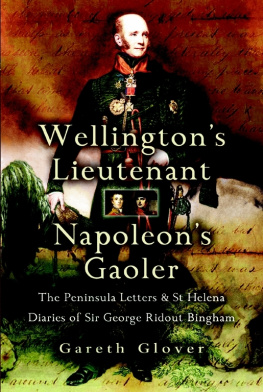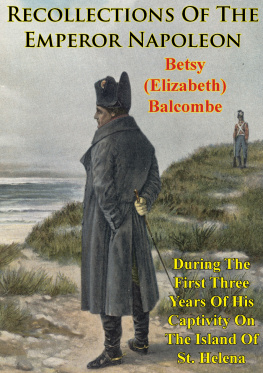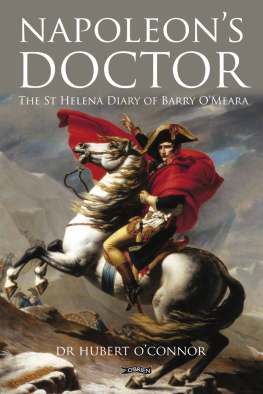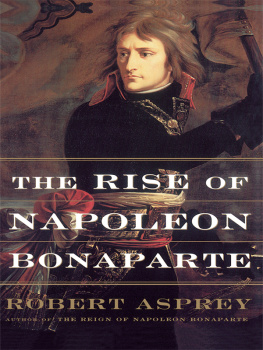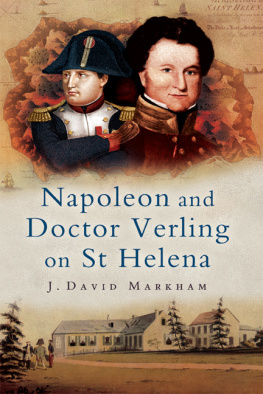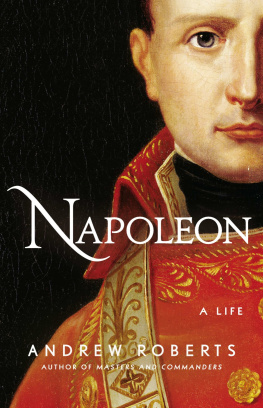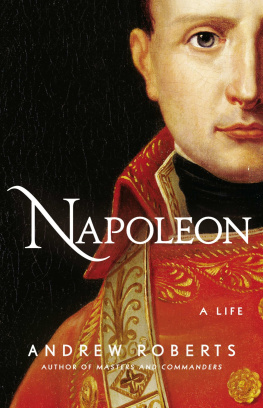Napoleons
Doctor

FOR ANNE
PARIS DUBLIN
6 JUNE 1946 13 MAY 2000
NEC FERAT ULLA DIES UT COMMUTEMUR IN AEVO
QUIN TIBI SIM JUVENIS TOQUE PUELLA MIHI
LET NO PASSAGE OF TIME CHANGE OUR AGE AT ALL
I WILL REMAIN YOUR YOUNG LOVER
YOU MY YOUNG BRIDE
Decimus Magnus Ausonius
AD 310395
Burdigala (Bordeaux)
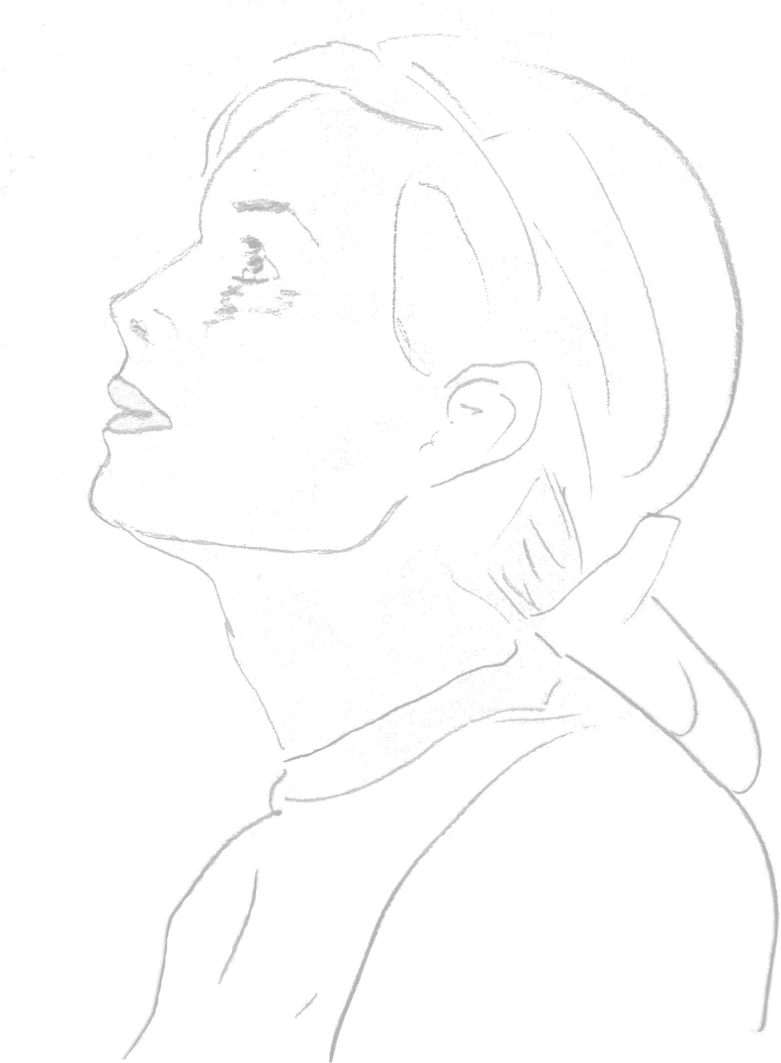
Contents
Introduction
Many years ago, after an enjoyable dinner, an old friend of mine, like myself a doctor, took a tattered, leather-bound volume from my shelves and began to read. The book, a two-volume work I had picked up in a dusty corner of Greenes famous bookshop in Clare Street, on the corner of Merrion Square, was called Napoleon at St Helena. My friend was fascinated, and so, intrigued in my turn, I took the book to bed that night and ended up reading till dawn. From that time on, I have pursued the remarkable story of Napoleons Irish doctor, Barry OMeara.
The life of a ships surgeon in the middle of a war can hardly be called hum-drum; but by 1815 the war with Napoleon was definitely over, and like many other British navy officers OMeara must have been wondering what the future had in store. Then, out of the blue, the chance came up of accompanying the greatest man of the age, the Emperor Napoleon, to the place of his incarceration and to act there as his private surgeon. It was an adventure too good to turn down.
For the next two and a half years OMeara lived in Napoleons house on St Helena, visited him virtually daily, sometimes spending long hours in conversation. OMeara carefully recorded Napoleons opinions on his generals, his opponents, his women, the Tsars and Emperors he knew, the politics of the Revolution and Napoleons own political and social ideas. What OMeara wrote down after those conversations forms one of the liveliest table-talk volumes of western history.
However, the situation he had somewhat impulsively accepted bristled with difficulties. Napoleon very much wanted to get off the island, and saw the semi-official bulletins OMeara issued on his health and the conditions of his captivity as a way of affecting British public opinion. At the same time, the British were concerned about the possibility of escape (he had, after all, escaped before, from Elba), and these fears were stimulated by wild talk of plots by US-based Bonapartists. The fact that the man whom the British had chosen to be Governor of the island and to supervise Napoleons captivity, Hudson Lowe, was fidgety, irascible, nervous and out of his depth, did not help.
In between Napoleon and the Governor was OMeara. He was both a medical man and a navy officer; he therefore owed loyalty to his service and discretion to his patient. Both his patient and the Governor, his military superior, demanded fealty. It was a situation that his upbringing, as an Irish Protestant, intimate with but not entirely trusted by either the colonial British or the native Irish, had prepared him for.
In England, OMearas reputation has suffered then and since from the ambiguities of the situation. Where the French saw the Governor as perfidious Albion at work, the English saw a hard-pressed imperial servant maligned by a devious Irishman. This latter point of view was most powerfully put by Walter Forsyth, a barrister, in his 1853 book, which forensically examined every detail then published, pouncing solemnly on every discrepancy. At the same time, from the humourless height of Victorian rectitude, Forsyth took OMearas lighthearted Regency robustness as a sign of depravity.
Since then we have learned a great deal more about what happened on St Helena in those fateful six years. More memoirs have been published, including major contributions from such participants in the daily drama as Count Bertrand, Baron Gourgaud, Louis Marchand and Major Gorrequer. And more and more it seems, given the awkward circumstances, Barry OMeara did an honourable job. Even those prejudiced against OMeara personally admit that his account is by far the liveliest of the St Helena narratives, and admit furthermore its essential truth. As Aubrey Octave put it: As an observer [OMeara] knew how to use his eyes and to tell what he saw. It is easy to understand the great success of his book when it appeared. Not so comprehensible is the discredit into which it has since been allowed to fall.
This book, on which I have finally embarked thirty years after that initial dinner, is an attempt to vindicate the reputation of OMeara, a man from my own country (Ireland), my own city (Dublin), my own university (Trinity) and my own profession (medicine).
This is essentially Barry OMearas story. But it also describes Napoleons final sad years on a distant island. In the course of my research, I have tried to read everything written by or about Barry OMeara. But regrettable gaps remain in the documentary record and, in places, while striving for the greatest possible accuracy, I have had to bridge the gaps by means of speculative reconstruction. The early 20th-century painter Albert Marque was famous for his ability to depict atmosphere. In the same spirit, I have tried to paint a personal picture of the Emperor and the Irishmanthe great Napoleon himself on St Helena and the Irish doctor who accompanied him there.
Note on sources
The pathos of the great Emperors last days on St Helena has attracted many writers, critical, romantic and prosaic. In fact the bibliography exclusively relating to the events on St Helena published by the Fondation Napoleon runs to 47 well-filled pages.
The core texts I have used are:
Lucia Elizabeth Abell (ne Betsy Balcombe) Recollections of the Emperor Napoleon, during the first three years of his captivity on St Helena: including the time of his residence at her fathers house The Briars (London 1844)
Barry OMeara An exposition of some of the transactions that have taken place at St Helena etc. 2nd ed (London 1819)
Barry OMeara Napoleon at St Helena (London 1888) originally published as Voice from St Helena (London 1822).
As well as the published diaries of the various participants, other significant texts include:
Octave Aubrey St Helena (Philadelphia 1936)
Arnold Chaplin A St Helena Whos Who (London 1909)
George Home Memoirs of an Aristocrat and Reminiscences of the Emperor Napoleon (London 1837)
E. T. Lean The Napoleonists (London 1970)
Herbert Maxwell (ed.) The Creevey Papers (London 1903)
Philip Henry Stanhope Conversations with the Duke of Wellington (London 1888).
Of all that has been written about Napoleon, I must mention two works which made a special impression on me and which I found especially helpful in writing my own book: Vincent Cronins Napoleon (London, 1970), and Paul Fregosis Dreams 0f Empire (London, 1989), the most interesting, factually informative and amusing accounts of the Napoleonic era written to date. I can warmly recommend them both.
Chapter 1: The Irish doctor
For over twenty years, since he first emerged in 1793 as a young artillery officer at a siege in Toulon, Napoleon Bonaparte had been the wonder and the despair of the world. His extraordinary energy had shaken the old countries of Europe to the rootsfirst France, then Italy, Germany, Spain, Portugal, not to mention Egypt, Russia and Syrianone would be the same after his passing through. By 1814, however, his enemies had been too much for him and he was incarcerated in the Mediterranean island of St Elba, not far from his Corsican birthplace. The diplomats of Europe packed their bags and prepared for a long and enjoyable session of haggling and self-indulgence at the Congress of Vienna. But they had not heard the last of Napoleon.
Next page

